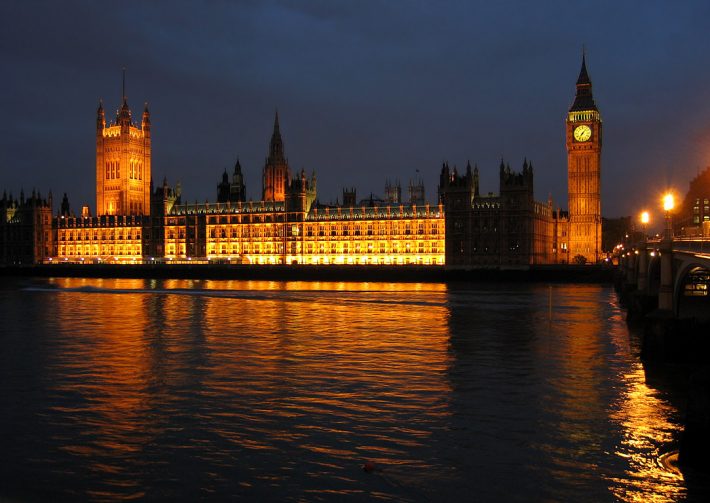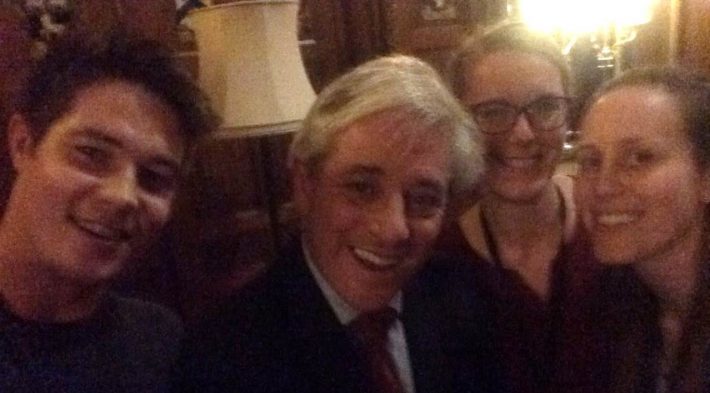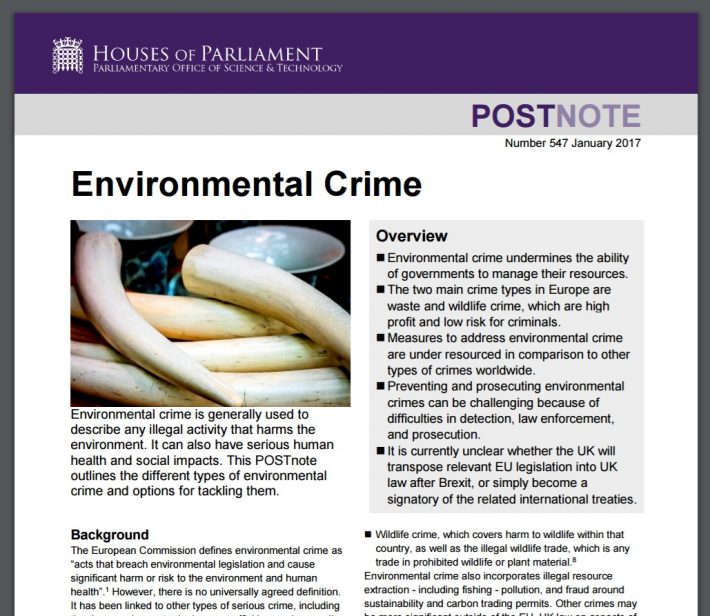Westminster, wildlife and waste crime: Lessons learnt during my BES POST Fellowship
BES Fellow Daniella Rabaiotti shares the top ten lessons from her placement with the Parliamentary Office of Science and Technology.

At the end of last year I spent three months working in the Parliamentary Office of Science and Technology (POST), producing a POSTnote – a four page summary of the problems associated with, and potential solutions to, environmental crime. This involved interviewing experts, attending parliamentary debates, organising events, finding my way around the Palace of Westminster (probably the hardest part), and meeting with MPs, Peers, and numerous parliamentary staff. Two weeks ago I finished my BES POST Fellowship with a well-attended briefing for parliamentarians to launch the Environmental Crime POSTnote. Working at POST was an incredible opportunity that allowed me to experience first-hand the inner workings of Parliament, talk with a wide variety of parliamentarians, experts and parliamentary staff, and become incredibly efficient at condensing a huge amount of information into a very small amount of space.
I learnt so many new skills and took on board so much new information, from the historical (suffragette Marjory Hume chained herself to the statue of Viscount Falkland, now in St Stephen’s Hall, and during her removal the spur on his right boot broke off) to the practical (there is a not so secret pass-holders entrance into Parliament from Westminster tube), that it would be impossible to include it all in a blog post. Instead, I have highlighted ten key things I learnt throughout the process, which I hope will be useful to other researchers.
1. How Parliament Works (ish)
Parliament can be a complicated, and at times very strange, place to navigate (both physically and mentally) – there is a lot of tradition, a whole load of departments, and thousands of employees. While I won’t claim to know all the intricacies of how it functions – I imagine it would take decades to get your head around everything – I certainly learnt a lot about how things are done, which departments do what, and especially the role of science in Parliament.
There are four main ways Parliament engages with science:
- Select Committees – these are groups of MPs, or Peers in the case of the Lords committees, from across all parties. They scrutinise the work of the government, consider policy and examine legislative proposals. They carry out inquiries and will often call for evidence from experts in the field, and debate current policy relevant issues.
- The Libraries – there is one for both the Commons and the Lords. The Libraries provide briefing papers on Bills as they move through parliament, which cover a wide range of topics, including the fields of science and the environment, and also answer members’ questions on specific topics.
- All Party Parliamentary Groups (APPGs) – these are groups made up of MPs and Lords from across all parties who share an interest in that topic. There are a huge range of topics covered. The groups meet in the evenings and often invite people with expertise in that field to come and speak or engage in discussion.
- The Parliamentary Office of Science and Technology (POST) – supports Parliament’s use of research evidence, acting as a bridge between external experts and parliamentarians. POST runs a wide variety of events on subjects related to science and technology, for both academics and parliamentarians, and produces POSTnotes and POST briefings – easily digestible reports that summarise a science or technology topic for parliamentarians. POST covers everything from social sciences to physics, and provides information and resources across the whole spectrum, producing around 30 POSTnotes a year.
2. MPs are really busy people
I mean REALLY busy. The average weekly hours worked by a new MP is over 70, which is a huge amount (about the same as us PhD students when we hit the write-up stage, am I right?). We hear a lot of ‘MPs don’t take an interest in science’ in the academic word, but often the fact of the matter is they really don’t have time to.
3. But they are also generally really friendly and approachable
I was amazed at how many MPs were happy to sit down and have a chat over a tea with me to talk about environmental crime. Most MPs I met had a lot of respect for scientists, and many were willing to chat about my research and the placement I was doing at events held in parliament. I even got a selfie with the Speaker himself John Bercow. If you have an issue you really care about it is always worth contacting your local MP.

4. How to communicate with parliamentarians
There are a fair few intricacies with getting titles correct when you first email MPs and Peers (especially Peers!). Making sure their staff are in the loop is key, as they generally manage their diaries. But once you are past that stage most communication is similar to what it would be with anyone else. Because MPs are so busy it is really important to break research down into short, concise and easy to read information, and keep events and meetings short and convenient (it helps if you throw in free food too, another thing MPs have in common with PhD students).
5. Having impact is all about talking to the right people, and being patient
You can talk to as many MPs as you like about your research, or a topic you are concerned about, but if they aren’t involved in the right parts of Parliament, or don’t move in the right circles within their party, it won’t have as much impact. Good people to talk to are those on Select Committees or those who have taken similar issues forward through the parliamentary process in the past.
6. Brexit will dominate Parliament for years to come
The question I was asked the most whilst working in Parliament was: ‘So, what is happening with Brexit?’ My answer was generally it is still early days, no-one really knows yet. What I can say though, is that Brexit is going to be THE issue over the coming years – MPs aren’t going to have a lot of time for much else. A lot of MPs have been clearing out weeks of their diary to make time for Brexit talks for a while now. This means it will be harder to get other issues heard. However this also means that if you have research that can inform Brexit decisions, MPs will be looking out for it.
7. People respond a lot quicker to a parliamentary email than one from a PhD student
All of the academics I emailed asking for an interview got back to me. Pretty sure that has never happened before.

8. A lot of scientists don’t know much about how Parliament works
I got asked ‘How is government?’ more times than I could count by fellow scientists. For the record Parliament and government are very different! Obviously not every researcher will be trying to get their research into policy, but if you are it is really easy to go and get a feel for how Parliament works. There is a wealth of information on the parliamentary website, including about Select Committees, APPGS, and a calendar of what is on in parliament. Anyone can go to a debate – it is your right as a citizen, it’s free and relatively easy bar getting through security (try not bring any knives). You can also watch debates online on the Parliament TV website, or read the transcripts on Hansard.
9. There are lots of opportunities to get involved as a PhD student or academic
There are a whole host of opportunities to get involved with Parliament, either through a POST fellowship, which are open to PhDs and postdocs through a wide range of organisations, or a number of other schemes. Most recently an academic fellowship scheme was launched for researchers at Universities with ESRC or EPSRC Impact Acceleration Accounts to come and work on a specific project in Parliament.
10. Environmental Crime
Before coming to this fellowship my research experience was all within ecology and conservation, so I knew a reasonable amount about aspects of environmental crime such as the illegal wildlife trade, illegal logging and raptor persecution. However I really did not realise the size and scope of environmental crime as a whole, and I had little legal knowledge. Researching and writing a POSTnote on my topic taught me a lot about environmental law (it’s complicated), and also other aspects of environmental crime, especially waste crime. I think when most people think waste crime they think fly-tipping, but it is genuinely a huge issue – illegal waste cases huge human health and environmental problems, as well as costing taxpayers millions of pounds each year. I had no idea any of this was going on, so it really expanded my knowledge on the topic. A great thing about writing a POSTnote is you really get to immerse yourself in a topic – talking about it every day with world experts means you learn a lot very quickly.
The BES sponsors an annual three month fellowship at the Parliamentary Office of Science and Technology (POST). Find out how to apply
Like what we stand for?
Support our mission and help develop the next generation of ecologists by donating to the British Ecological Society.